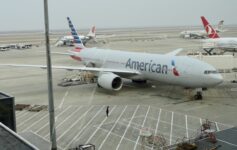A judge struck down the JetBlue-American Airlines Northeast Alliance (NEA) complicates JetBlue’s Spirit acquisition plans.
If you are considering booking travel or signing up for a new credit card please click here. Both support LiveAndLetsFly.com.
If you haven’t followed us on Facebook or Instagram, add us today.
Judge Strikes Down Northeast Alliance (NEA)
American Airlines and JetBlue have been codesharing flights through its Northeast Alliance (NEA) for the last couple of years. Through this agreement the two share revenue and passengers on select routes throughout the northeast United States. This meant that American and JetBlue abandoned certain routes and frequencies without merging entirely. Codeshare agreements exist for many airlines but this was unique as the two airlines directly competed on so many routes. For the carriers, they are able to repurpose aircraft elsewhere increasing utilization of their fleet.
After a long trial in which the Justice Department was suing the carriers for the agreement, federal Judge Sorokin wrote the following key remarks in his 94-page ruling.
“Whatever the benefits to American and JetBlue of becoming more powerful — in the northeast generally or in their shared rivalry with Delta — such benefits arise from a naked agreement not to compete with one another. Such a pact is just the sort of ‘unreasonable restraint on trade’ the Sherman Act was designed to prevent.” and;
“American and JetBlue are two of the four largest carriers operating in New York, and two of the largest three in Boston. Delta Air Lines is the only other carrier with a large presence in Boston. Besides Delta and United Airlines, no other carrier matches or approaches in size the defendants’ respective positions in New York.”
The judge added that despite some 3,600 pages of in-court testimony, 2,700 pages of depositions, 50 binders of additional evidence, and 600 post-trial pages, the defendants lacked an ability to prove a true benefit to consumers. He noted,
“The lawsuit culminated in a month-long bench trial featuring testimony by two dozen witnesses, most of whom were either executives of the defendants or experts paid for their testimony by one side or the other.”
The head of DOJ added:
“Today’s decision is a win for Americans who rely on competition between airlines to travel affordably,” U.S. Attorney General Merrick Garland said in a statement. “The Justice Department will continue to protect competition and enforce our antitrust laws in the heavily consolidated airline industry and across every industry.” – CNBC
It’s worth noting that Live and Let’s Fly founder, Matthew Klint, wrote this week that he doesn’t believe the order will survive appeals and the ruling is more or less moot.
How It Helps JetBlue’s Acquisition Plans
There’s an industry notion that the NEA would be used as a bargaining chip for the DOJ to negotiate the approval of JetBlue’s acquisition of Spirit Airlines. The theory is that it would be impossible for the DOJ to allow JetBlue to both acquire Spirit and codeshare with American giving the airline an unfair advantage as a much larger airline firmly in the fifth pole position in US market.
With the NEA potentially off the table, JetBlue’s acquisition of Spirit is a shorter leap. It also would affirm JetBlue and Spirit’s statements that it intends to create “a national, customer-centric, low-fare alternative to the dominant “Big Four” airlines.” Partnering with American made its proposed competion with them, at least in the Northeast, unlikely.
How The Ruling Could Hurt JetBlue’s Purchase of Spirit Airlines
The DOJ’s pursuit of this case and its victory gives more teeth to the DOJ’s claim that JetBlue’s purchase of Spirit would be disadvantageous to consumers. Unlike a merger of (near) equals, as Spirit and Frontier had proposed both as ULCC airlines, JetBlue intends to convert Spirit aircraft and business model to its current structure. While JetBlue tends to price lower than the Big Four airlines, it is not a ULCC carrier and many could successfully argue that it’s not even an LCC carrier. What makes JetBlue’s approach tougher to approve is that it involves the removal of a carrier from a different business model, unlike when United and Continental merged (for example.)
The DOJ could be enboldened by the decision and the case itself could be part of the DOJ’s evidence that JetBlue has no intention to foster a competitive environment and will gladly joing arms with a competitor to get bigger themselves.
JetBlue also loses a negotiation chip in the process as it cannot now sacrifice or scale back its NEA partnership to win the Spirit case.
Conclusion
I’m not an attorney so my assessment is little more than an industry writer and observer. Matthew may be right and the ruling may be overturned. But if it’s not, JetBlue CEO, Robin Hayes, has bet everything on growth. This ruling is a costly setback but if it also portends the failure of the Spirit acquisition, it will be hard for Hayes to remain at the helm, and difficult for shareholders to swallow all of these losses.
What do you think? Does the loss of the NEA complicate matters for JetBlue’s acquisition of Spirit Airlines?




The B6/NK merger is far more problematic than the NEA and on paper anyway, is bad business. B6 is paying a huge premium, and then taking on huge integration costs to harmonize the NK fleet into its own, which will take years. Shareholder value is eroded for a good deal of time (though who really is invested in either B6 or NK?)
The NEA was a messy way for AA and B6 to compete on a more level playing field, domestically, at JFK and BOS, though B6 has a major presence at JFK and BOS and AA needs B6 more than the other way around. It was also a way to side step the enormous costs AA would have to shoulder to build NY out, which it has done the exact opposite of, since 2002.
The future is further consolidation. The industry is headed for a major downturn and there will be neither the political will nor the buy in for a further series of bailouts. Business travel is not going to return to 2019 levels. Leisure demand will level off if the economy tips into recession. JetBlue, Alaska, Frontier, and Spirit are all headed into the arms of one of the US4. Southwest will need a merger to clean out its c-suite and fix its operations.
“It’s worth noting that Live and Let’s Fly founder, Matthew Klint, wrote this week that he doesn’t believe the order will survive appeals and the ruling is more or less moot.”
That isn’t what Matt said. Matt said:
“While I am unaware [unsure?] of how this case will turn on appeal, I am very confident that once the appeal is filed, a stay will be placed on Judge Sorkin’s ruling, meaning business as usual will continue…foreseeably for the next several months.”
A stay is different than overturning the ruling.
Honestly Kyle has poor takes half the time. His journalism isn’t great. Matt is miles ahead.
Hehe…miles ahead. I see what you did there. 😉
Yes, but its Matt’s blog, so the onus is on him to do quality control.
That being said, Kyle’s takes can be comic relief sometimes. Like that airlines should invest in bitcoin, which he suggested when bitcom was $57k, more than double what it is today.
You have no proof of this.
The mergers that have been allowed in the airline business over the past 20 years have not created great results for customers. Why does the JetBlue Spirit deal have to follow different rules and how is it different if the merged company does not produce a win for customers after all of the other mergers didn’t do that?